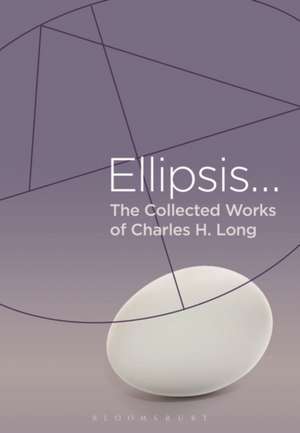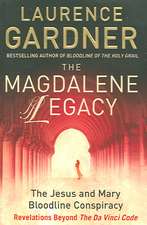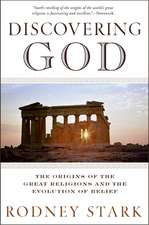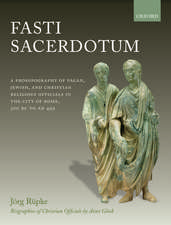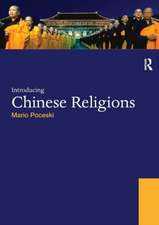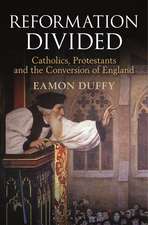The Collected Writings of Charles H. Long: Ellipsis
Editat de Charles H. Longen Limba Engleză Hardback – 21 feb 2018
| Toate formatele și edițiile | Preț | Express |
|---|---|---|
| Paperback (1) | 230.13 lei 6-8 săpt. | |
| Bloomsbury Publishing – 24 mar 2021 | 230.13 lei 6-8 săpt. | |
| Hardback (1) | 874.05 lei 6-8 săpt. | |
| Bloomsbury Publishing – 21 feb 2018 | 874.05 lei 6-8 săpt. |
Preț: 874.05 lei
Preț vechi: 1542.32 lei
-43% Nou
Puncte Express: 1311
Preț estimativ în valută:
167.25€ • 175.06$ • 139.20£
167.25€ • 175.06$ • 139.20£
Carte tipărită la comandă
Livrare economică 31 martie-14 aprilie
Preluare comenzi: 021 569.72.76
Specificații
ISBN-13: 9781350032637
ISBN-10: 1350032638
Pagini: 456
Dimensiuni: 169 x 244 x 35 mm
Greutate: 1.04 kg
Editura: Bloomsbury Publishing
Colecția Bloomsbury Academic
Locul publicării:London, United Kingdom
ISBN-10: 1350032638
Pagini: 456
Dimensiuni: 169 x 244 x 35 mm
Greutate: 1.04 kg
Editura: Bloomsbury Publishing
Colecția Bloomsbury Academic
Locul publicării:London, United Kingdom
Caracteristici
The definitive collection of the work of one of the most influential and pioneering scholars in the study of religion from the past 50 years
Notă biografică
Charles H. Long was Emeritus Professor of Religious Studies at the University of California, Santa Barbara, USA. He was the author of Significations: Signs, Symbols, and Images in the Interpretation of Religion (1986). Over a long career, Long held professorial positions at the University of Chicago, the University of North Carolina at Chapel Hill, Duke University, and Syracuse University. In addition, he served as a visiting professor at Tsukuba University in Japan, the University of Queensland in Australia, and Capetown University in South Africa.
Cuprins
ForwardPermissionsAcknowledgementsIntroductionPart One: America and the Study of Religion 1. America, Religious Interpretations of2. New Orleans as an American City: Origins, Exchanges, Materialities, and ReligionPart Two: Theory and Method in the Study of Religion 3. The Study of Religion in the United States of America: Its Past and Its Future4. Mentalities , Myths, and Religion5. Encountering Wach: Hermeneutics, Religious Experience, and America6. Introduction, written by Professors William Clebsch and Charles H. Long to the Reprint of Morris Jastrow, Jr's The Study of Religion7. A Look at the Chicago Tradition in the History of Religions: Retrospect and Future8. The Chicago School: An Academic Mode of Being9. The University, the Liberal Arts, and the Teaching and Study of Religion10. Mircea Eliade and the Imagination of Matter11. Popular Religion12. Transculturation and Religion13. The Religious Implications of the Situation of Cultural Contact14. New Space, New Time: Disjunctions and Context for a New World Religion15. Religion, Discourse and Hermeneutics: New Approaches to the Study of ReligionPart Three: African American Religion in the United States 16. African American Religion in the United States of America: An Interpretive Essay17. Assessment and New Departures for a Study of Black Religion in The United States of America18. Rapporteur's Commentary19. What Is Africa to me?: Reflection, Discernment, and Anticipation20. Bodies in Time and the Healing of Spaces: Religion, Temporalities, And HealthPart Four: Kindling, Embers and Sparks 21. Passage and Prayer: The Origin of Religion in the Atlantic World22. Outline for Continuing Research For Understanding of Religion and its Study23. From Colonialism to Community, Religion and Culture in Charles H. Long's Significations24. Charles H. Long Interviewed by David Carrasco, the Neil L. Rudenstine Professor for the Study of Latin America, The Peabody Museum and the Harvard Divinity School25. The Humanities and 'Other' Humans26. History, Religion and the Future27. Enlightenment, Ancestors, and Primordiality: A note on Modernity and Memory28. Encounters with Korean Ancestors: Rituals, Dreams, and Stories29. The West African High God: History and Religious Experience30. Primitive/Civilised: The Axial Age in a World Context31. Theodicy as/and and Modernity: Comments on Mark M. S. Scott's paper, Theorizing Theodicy in the Study of Religion.32. Religion and Mythology: A Critical Review of Some Recent Discussions33. Book review - Other Times, Other Places: Myths and Cities in Meso-American Religion34. Book review - The Dreams of Professor Campbell: Joseph Campbell's The Mythic Image35. The Gift of Speech and the Travail of Language36. Introduction to the Wesleyan University Edition of Henri Baudet's Paradise on Earth37. How I Changed my Mind or NotIndex
Recenzii
Those less familiar with Long's work will find The Collected Works of Charles Long to be an invaluable resource for undergraduate and graduate classes within American Religious History, Religious Studies, or African American Religious History.
Throughout these thirty-eight essays (some unpublished), Long moves effortlessly from textured historical narrative to hermeneutics and back again, all in his unique voice. Simply put, this book is absolutely essential for anyone with a serious interest in questions of method and theory or the history of the discipline.
A wonderfully complex, yet accessible, compendium of his own writings ... Long welcomes and engages the reader right from the start through a warm narrative that opens the book ... Fascinating and impressive ... [It] should earn an important place in the field of religious studies. The breadth of Long's knowledge about American religion and the readability of the text lends itself to becoming a volume of lasting importance.
This publication brings forth some of the best and most powerful thought and writing by the great innovator Charles H. Long. It combines turning points, immersions and illuminations that make up the history of the history of religions à la Charles H. Long. It fulfils a promise Long made years ago to his students that he would give us a lively record of his ingenuity, commitments and insights. A gift!
This is the book I have been waiting for from Charles H. Long. In one volume, the reader is treated to the seminal work of Long over the course of his lengthy academic career as a historian of religion. Long's probing insights, the power of his imagery, his careful and persistent mining of fundamental questions to the drama of religion in human lives lays bare the rich terrain of human lives that are often obscured and unheeded. Long encourages us to expand our horizons as we mine the depths of our humanity.
This is the book for which academics have long waited-the collected writings of a beloved scholar who has inspired generations in the critical interpretation of religion, race, and the modern world. The theoretical insights of Charles H. Long's capacious intellect adorn every page of this text. Long is an intellectual reckoning made flesh, and he has now bequeathed to readers a legacy of brilliance in long-form.
Charles H. Long is the veritable African-American doyen of critical Religious Studies. This well-selected collection wonderfully illustrates his intellectual strengths, showing how he has always been prepared to address even the hardest questions and also the grounding of his illustrious career in the University of Chicago. These essays reveal Long in his ceaseless quest to understand humanity's religious meanings, his common provocations about the troublesome expansion of 'civilizing' Europeans and its implications, as well as his continuing appreciation of Chicago.
It has been a long time coming for scholars to take up this serious effort in all of its depth, variety, and splendour in forging an elliptical thinking inspired by the thought of Charles H. Long.
Throughout these thirty-eight essays (some unpublished), Long moves effortlessly from textured historical narrative to hermeneutics and back again, all in his unique voice. Simply put, this book is absolutely essential for anyone with a serious interest in questions of method and theory or the history of the discipline.
A wonderfully complex, yet accessible, compendium of his own writings ... Long welcomes and engages the reader right from the start through a warm narrative that opens the book ... Fascinating and impressive ... [It] should earn an important place in the field of religious studies. The breadth of Long's knowledge about American religion and the readability of the text lends itself to becoming a volume of lasting importance.
This publication brings forth some of the best and most powerful thought and writing by the great innovator Charles H. Long. It combines turning points, immersions and illuminations that make up the history of the history of religions à la Charles H. Long. It fulfils a promise Long made years ago to his students that he would give us a lively record of his ingenuity, commitments and insights. A gift!
This is the book I have been waiting for from Charles H. Long. In one volume, the reader is treated to the seminal work of Long over the course of his lengthy academic career as a historian of religion. Long's probing insights, the power of his imagery, his careful and persistent mining of fundamental questions to the drama of religion in human lives lays bare the rich terrain of human lives that are often obscured and unheeded. Long encourages us to expand our horizons as we mine the depths of our humanity.
This is the book for which academics have long waited-the collected writings of a beloved scholar who has inspired generations in the critical interpretation of religion, race, and the modern world. The theoretical insights of Charles H. Long's capacious intellect adorn every page of this text. Long is an intellectual reckoning made flesh, and he has now bequeathed to readers a legacy of brilliance in long-form.
Charles H. Long is the veritable African-American doyen of critical Religious Studies. This well-selected collection wonderfully illustrates his intellectual strengths, showing how he has always been prepared to address even the hardest questions and also the grounding of his illustrious career in the University of Chicago. These essays reveal Long in his ceaseless quest to understand humanity's religious meanings, his common provocations about the troublesome expansion of 'civilizing' Europeans and its implications, as well as his continuing appreciation of Chicago.
It has been a long time coming for scholars to take up this serious effort in all of its depth, variety, and splendour in forging an elliptical thinking inspired by the thought of Charles H. Long.
